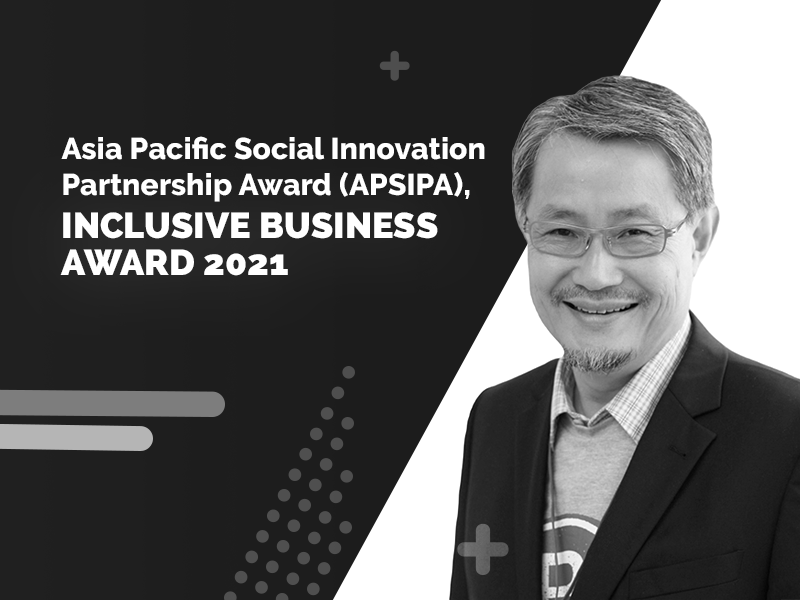
Asia Pacific Social Innovation Partnership Award (APSIPA), Inclusive Business Award 2021
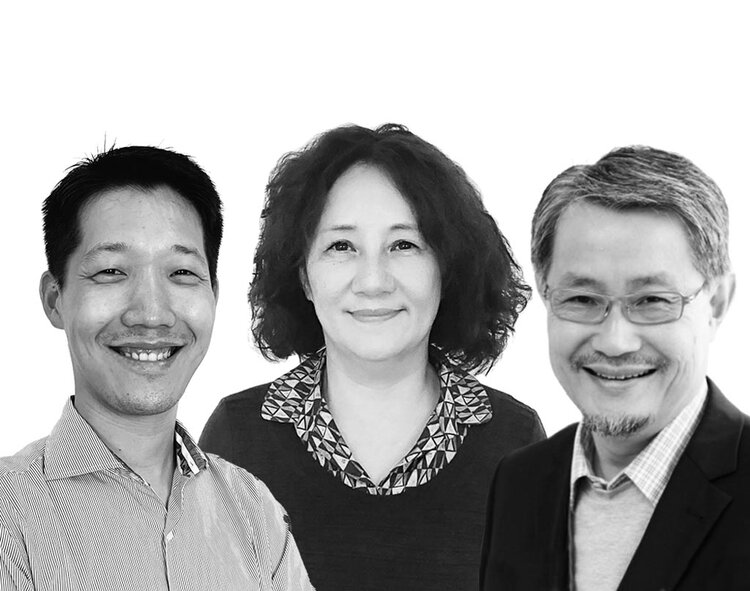
The award sets motivating social innovation partnerships as its purpose, integrating 17 SDGs sorted into three categories, Biosphere Sustainability, Inclusive Business and Social Prosperity. Three winners were chosen from each category and there was one Special Jury Prize chosen by the judging panel.
The Inclusive Business Award values socially innovative approaches to economic activities and commerce. Innovation, in terms of economics, does not only imply increase in income or employment, but also decrease in inequality and negative impacts, as well responsible measures to forward economic growth and cycle. The highly related corresponding SDGs are SDG8: Decent Work and Economic Growth, SDG9: Industry, Innovation and Infrastructure, SDG10: Reduced Inequality and SDG12: Responsible Consumption and Production.
APSIPA INCLUSIVE BUSINESS WINNERS
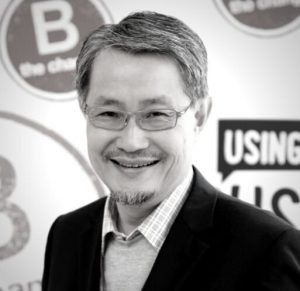
THOMAS NG
GENASHTIM
Thomas Ng and Genashtim are synonymous and born out of Thomas’ passion to give hope to the people that the corporate world had left behind. His vision was to leverage technology and the internet to connect marginalised communities to the global economy. Today, Genashtim operates 100% remotely, providing online learning and support services globally. About 60% of its staff are people with different disabilities, 25% are refugees, and another 10% are LGTBQ and seniors across more than 10 countries.
In 2004, Thomas left behind his corporate lifestyle after 25 years’ service to build Genashtim which is now a world acclaimed entity recognised as “Best for the World” among B Corps for 4 consecutive years. Besides Genashtim, Thomas also serves in leadership positions in YPO and the ASEAN Responsible and Inclusive Business Alliance (ARAIBA). He is also one of the Founding Global Advisors for The Knowledge Pledge.
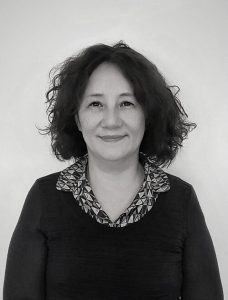
Ms. Ban-Wen, Lin (Julie) is the director member of Homemakers Union Consumers Co-op (HWCC). She is a devoted environmental advocate, pursuing projects meant to benefit the needs of the earth. She has delivered lots of speeches and workshops of cherishing food. She believes that citizens can take action within their daily lives and communities to reduce food waste in the home, when shopping, at schools, at work and in restaurants. They can also influence the actions of every other sector of the food supply chain.
She also believes HUCC has an important role to play in raising awareness about food waste among consumers and supporting behavior change, through “Collective Buying”. In HUCC, collectively as a co-op, the common needs for genuine good food will lower the food waste rate. At the same time, their members change the farmers and producers in farming and processing while making their livelihood decently.
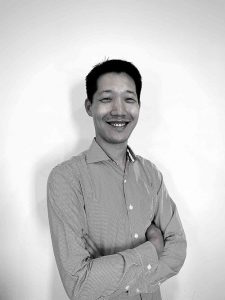
HIGHLIGHTS FROM THE PANEL
[Tom Allen] – Thank you very much for joining us. Julie, we’ll kick off with you today. Can you please share a little bit about your project, the impact that it’s creating and what led to your passion in social innovation?
[Ban-Wen Lin (Julie)] – Thanks Tom. Our project is about stopping food waste and reducing the food consumption rate. Last year, we lowered the food waste to 4%, which was quite an achievement. How do we do it? I would like to say it’s through three actions. First of all, we balance the food mileage, reducing the risk of damage during delivery. Headquarters are in charge of producer purchases, dispatch and balancing delivery mileage through distributing fruits and vegetables in Taiwan. During harvest, the outer leaves of the vegetables are kept, lowering the risk of damage to the produce during delivery. The outer leaves are later peeled off, which is why 80% of the waste comes from the outer leaves. The second action we take is we reuse the 4% of leftover food to make the most of it.
FOR EXAMPLE, ALL THE LEAVES, FRUITS AND VEGETABLES WE USE TO REDUCE THE LOSS OF A HARVEST BY THE FARMERS. 60% ARE SENT TO A COMPOST AREA, 22% ARE TURNED INTO COMMUNAL MEALS FOR PURCHASING MEMBERS, 12% GO TO CHICKEN FEEDING, AND 6% ARE REUSED IN FOOD CHERISHING CHARITIES. THE VALUE OF THE LEFTOVER FOOD IS MAXIMISED BY REUSING 84% OF IT.
Our co-op right now has about 70,000 members. That is quite the effort to let members have a collective buying power. The third action is with developing the products to balance the supply and demand with the food purchasing. As I mentioned earlier, we call this term buying power, especially for Chinese Festivals like the Chinese New Year or Dragon Fruit Festival. Most people in Taiwan will buy lots of food, and sometimes that is a cause of food waste. We focus on planning in advance with systems for pre-ordering produce, and that is a good way to help us stop food waste it. That’s a lot of what we have done in the past few years.
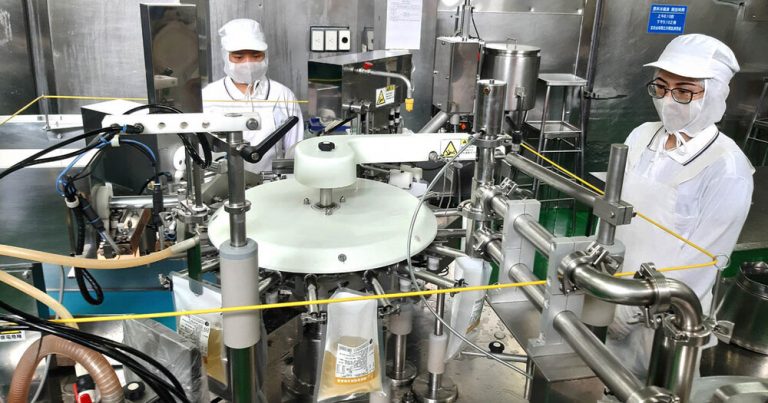
Homemakers Union Consumers Co-op (HWCC)
To sum up, first we have a role in reducing consumption, which means a balance of supply and demand, secondly, we have our own product development and festival pre-order system for whole foods, and lastly, we balance food mileage ensuring freshness and the success of food delivery.
Well done, Julie. There’s a fantastic body of work there. Building that co-op to 70,000 members and reducing food waste in that way is fantastic.
Thomas let’s move to you and hear a little bit more about Genashtim. Please just tell us a little bit more about this project and the impact that you’re creating?
[Thomas Ng] – I will start with why I got into this industry in the first place. I retired from my corporate life very early. I had 25 years in corporate work and spent the last 15 years as an expatriate in Asia. My last job was the country manager and president for a big multinational company in the Philippines. When I retired, I was invited to join the Board of Trustees for a computer school for the blind. When I figured out and saw how blind people can very efficiently use computers, access the internet and do things, I thought that they should be employed. But apparently, after training 500 blind people to use computers, hardly any one of them were working.
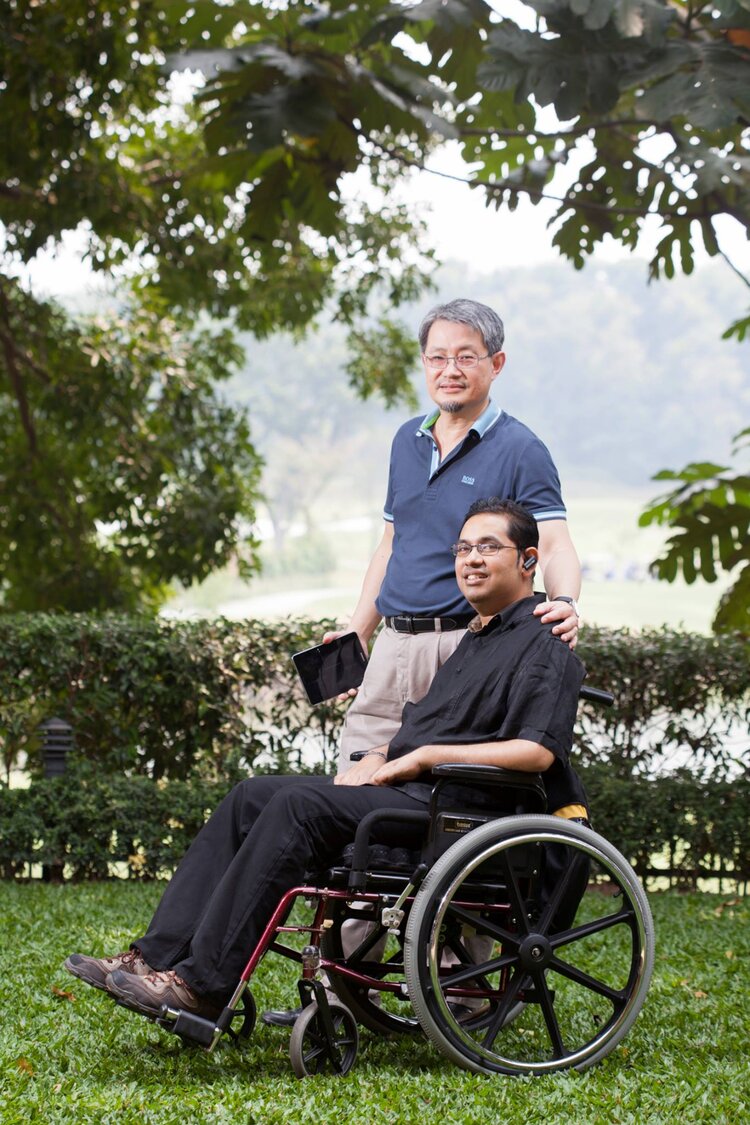
We have people across six continents, and we are delivering everything digitally, so that’s been a very satisfying outcome in a sense. I mean, I’ve felt sorry for a lot of people who suffer from COVID-19, but we have actually thrived. I also would like to add that the people who worked for us initially were all disabled, and many of them are severely disabled. We have about three or four employees who can’t use anything below their neck, so they’re using their voice to activate the computers. We have many employees who actually work from their bed as they can’t even sit up. We also have mentally impaired and autistic people who work for us, and they’re particularly good at compliance jobs. We even have a lady who actually is not only paralysed from the neck down, but she can’t breathe on her own. She has to be on a ventilator 24/7. We had about 70 employees of which 90% had disabilities in 2018, so then we started to hire refugees. These are Middle Eastern refugees who are stuck in Indonesia.
TODAY, WE HAVE ABOUT 120 EMPLOYEES ON OUR PAYROLL ACROSS THE WORLD. ABOUT 60% OF THESE PEOPLE HAVE DISABILITIES, 20% REFUGEES AND ANOTHER 10% ARE EITHER SENIORS, LGBTQ, HIV INFECTED OR WOMEN FROM AN OPPRESSED ENVIRONMENT.
We hire women who can work from places like Afghanistan and Pakistan, where it’s not so easy for them to join the workforce.
Thomas, that’s an extraordinary effort there to grow that team and to provide that opportunity to such a diverse group of people. Well done on those efforts today.
Lance, let’s talk a little bit about HESED now. I would love to learn a little bit more about this project, the impact you’re creating and what led to your passion in this area?
[Lance (Lee Cheol) Lee] – Thank you for the question.
MY COMPANY HESED DISCOURAGES SOCIAL PROBLEMS SUCH AS POVERTY, LACK OF WORK, EDUCATION, GENDER EQUALITY, AND ENVIRONMENTAL DEGRADATION IN CAMBODIA.
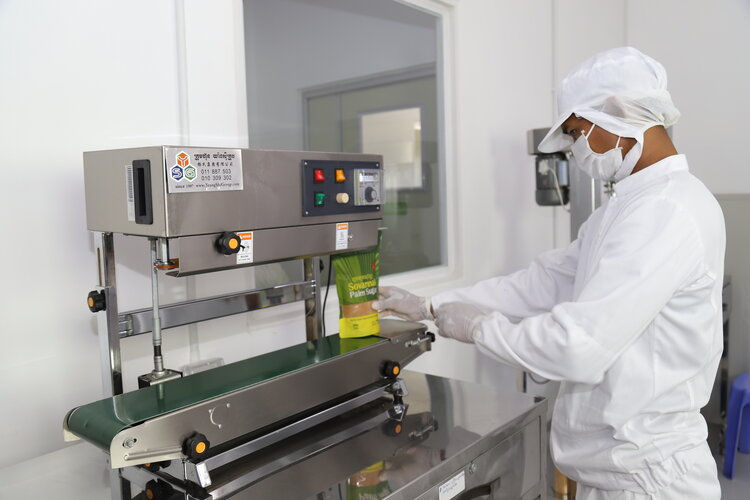
HESED Agriculture Trading Co., Ltd
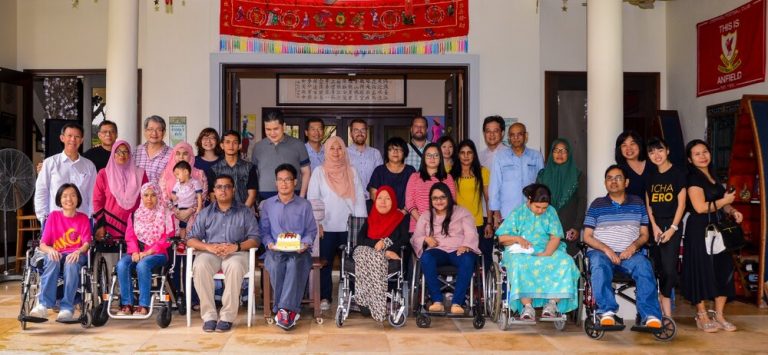
Genashtim
Some great insights there Thomas and thank you for sharing the work that you’re doing with RAISE as well. I’m very familiar with their work and know that they’ve been involved in previous years with the Social Enterprise World Forum. It’s great to have that body there in Singapore, which is helping to promote the movement more broadly as well.
Lance let’s move on to you now. You’re based in Cambodia, so what are your observations of the movement in your area and further afield? As you know, Cambodia is developing and one of the poorest countries globally. NGOs and international organisations support many areas of social innovation, so I think I can say a few things about the social innovation movement in Cambodia. The first thing is how there is an inclusive system. The official development system’s goal is to incorporate broader, inclusive partnerships between people in developing countries, rather than using a retro system. Many aid projects usually seize all activity, in other words, the sustainability wasn’t constant.As you know, Cambodia is developing and one of the poorest countries globally. NGOs and international organisations support many areas of social innovation, so I think I can say a few things about the social innovation movement in Cambodia. The first thing is how there is an inclusive system. The official development system’s goal is to incorporate broader, inclusive partnerships between people in developing countries, rather than using a retro system. Many aid projects usually seize all activity, in other words, the sustainability wasn’t constant.
Therefore, the trend is that they co-work with a social company, with a focus on sustainability and creating social value to solve the various social problems in a developing country. My second observation is about the expansion of inclusive business. All of these years, the Cambodian government created a department under the Ministry of Industry, which promotes and has established the strategy for inclusive business, with the support of the UN ESCAP and Inclusive Business Action Association. The remarkable thing is ESG management is one of the criteria for discovering and evaluating a company with the inclusive business model at the government level.
Thirdly, the social entrepreneur is not currently on the rise in Cambodia yet. However, the big companies such as Smart and Sarkar in Cambodia are fostering the social entrepreneur through various things like incubation and a capacity building program with social network organisations. Compared to other ASEAN developing countries, the Cambodian social economy is still poor. However, I think that the movement is trending fast and has a high potential. We will communicate more with various networks to participate in building Cambodia and the impact ecosystem.
Thank you very much Lance for those insights. There is some great work happening there in Cambodia, and it’s so good to hear that there is a movement there.
Julie let’s cross to you. You’re based in Taiwan. What you are observing in this movement of social innovation in your country and further afield.
I noted some successful examples of pioneering social enterprises which have demonstrated key elements of innovation in Taiwan. We know social enterprises have been developing in Taiwan for over a decade and have been gaining a better public awareness in recent years. Over this period from a policy perspective and in practice, they have taken a lot of responsibility and have fulfilled a lot of expectations. So, where do I see key opportunities and next steps? Well, personally, I think enhancing awareness is very important. It’s considering [how] do you promote it across sectors including both the public and private sector with better results?
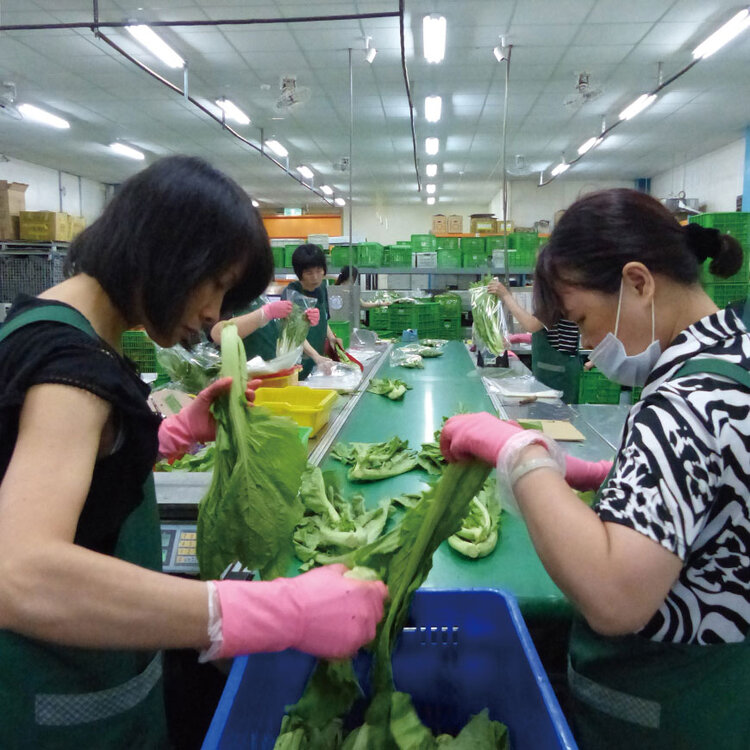
Homemakers Union Consumers Co-op (HWCC).
I’m thinking the government or NGOs should keep encouraging social innovation in public problem solving and facilitate multi-stakeholder participation in social economic development, including social enterprise in the co-op. In addition, I think more and more we, as a nation, are coinciding with the SDGs. We’ve cooperated with our stakeholders and worked together with innovative social enterprises as well as exhibit greater flexibility in operating social enterprises and apply the trial-and-error approach in creating social innovation. That’s my personal observation of the social innovation movement in Taiwan.
Thank you very much Julie. There are some great insights there too, and we have certainly observed some momentum building there in Taiwan over the years. It’s great to see it moving forward.
You’ve all been working very hard on building your initiatives and creating this impact, so what is one piece of advice that you would give to other businesspeople who would like to use a more inclusive approach? Should we start with you Lance?
Of course, being competitive as a business is very important, but the most important thing especially in inclusive business is why the founder is doing it?
MORE SPECIFICALLY, DOES THE FOUNDER HAVE A CLEAR DEFINITION OF THE SOCIAL PROBLEM THAT THEY ARE TRYING TO SOLVE, AND ARE THEY AIMING FOR IT?
This is a very important criterion, that the founder themselves define with a very clear intention and direction that we through this inclusive business are going to solve this problem. It should be clearly established why you are doing this business, only then will the company’s intention to solve the social problem during their growth remain unchanged, and you can get the real social impact and value as well.
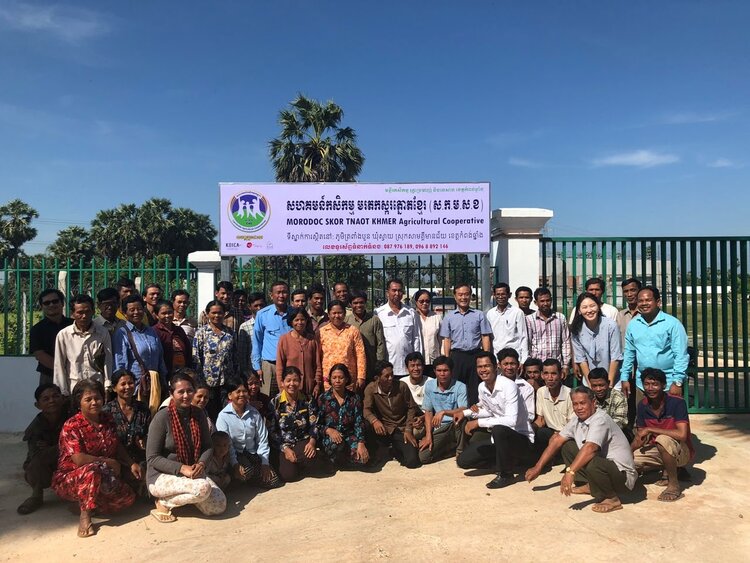
HESED Agriculture Trading Co., Ltd
Thank you very much Lance. That’s a great perspective there and starting with your why and communicating your why is just so important.
Julie, what’s one piece of advice that you’d give?
We are a cooperative, we put people first and we want ethical and fair results for them. Then, we are also a business, so I would say it is important to promote cross sector cooperation for the creation of social capital, given the unique attribute of social entrepreneurship or co-op in being together. Also, combine different stakeholders and the community’s resources. That’s what I’m thinking right now.
It’s a great thought there, and thanks for sharing that reflection.
Thomas let’s hear some advice that you have considering your experience in setting up your enterprise. What would you say?
Tom, I’m so glad that you actually asked the question of what other businesspeople can do, because whilst I think it’s of course great that we have social innovators and entrepreneurs with a strong purpose like we have alluded to, I think that the movement can get a lot more acceleration and bigger impact if existing businesses choose to align the way they do business with ESG principles. To do this, there are today very useful and easy tools which you can use, and the ones I’m going to suggest are actually free. One is the SDG Action Manager, which was launched by a global compact, the United Nations Global Compact.
That tool was actually provided by B-Lab, which is the non-profit organisation behind the B-Corp Certification. That is quite simple to use, and you can choose to do any number of the SDGs, you don’t have to do all of them. If you want to get a bit more serious with the SDG Action Manager, you can actually transition into the B-Impact Assessment. The B-Impact Assessment is a more in-depth assessment, which goes into your business and gives you an assessment.
It also shows you what are the other things you can do to improve. It provides a roadmap for you to progress and really align your businesses over time. I believe that if all businesses were to do this and think this way, there would be a much bigger impact that will come to society.
Great insights there Thomas. Let’s finish off our interview now with some recommendations. When it comes to books, resources, web pages and podcasts, there’s a whole heap of inspiration out there. Julie, what would you recommend to our listeners?
I’m going to recommend the International Cooperative Alliance. This website is easy to find. Because the co-op was established in 1895 to promote the cooperative model. Today, when we are talking about social innovation, actually it is not a new idea, because about 200 years ago these pioneers had established the innovative model.
From the website, I think anyone can gain some knowledge about the cooperative model and what business driven by values and not by the remuneration of capital. I think that is a cool way to start to know what a co-op is. Thank you, Tom.
Thanks Julie. It sounds like a great resource there.
Thomas let’s talk about your books, resources or other recommendations to our listeners.
This is an easy one. There is a book that was published in September last year called Better Business by Professor Chris Marquis. Chris started his life as the vice president of JP Morgan Chase, and then went on to lecture at Harvard University for 10 years and even lectured at the Kennedy School. In recent years, he has been with Cornell University as the head of ‘Global Sustainable Enterprises’. Chris has a wealth of knowledge; he’s travelled the world extensively; he was a frequent visitor to Asia and sometimes lectured at the top universities in China as well. I believe Chris actually speaks better Mandarin than I do! His book is called Better Business.
Thank you very much Thomas, that sounds like a great resource there.
Lance let’s finish off with you. What books or resources would you like to recommend?
I have to recommend The Business Solution to Poverty. The book was written by Paul Polak and Mal Marwick, with the buzzword nouns ‘the entrepreneur’ and ‘poverty activist’.
It’s also about how to lead companies in the future through securing sustainability in central lane markets. This book has already been published for six years, but it has great meaning for me to remind me of the beginning of my business again. It will give a good insight to those who create inclusive businesses.
Thanks so much to all of you today for sharing your really generous insights and time. Congratulations again on winning the APSIPA Inclusive Business Award. We’ll look forward to tracking your journeys into the future and touching base down the line.
This content is sponsored by Small and Medium Enterprise Administration, Ministry of Economic Affairs, Taiwan.
Recent Posts
- Thomas Ng Appointed Advisor of S$120M B Corp Championing Sustainable Succession
- Reinventing with Purpose: Thomas Ng Joins the Voices of Reinvention Panel
- Elevating Leadership: A Transformative Session with Guy Russo
- Thomas Ng’s Feature on UVU Women in Business Impact Lab Podcast: “Empowering Marginalized Communities”
- Bintang Capital Conference News Article for Thomas’ Website
Recent Comments
Archives
- April 2025
- August 2024
- April 2024
- March 2024
- January 2024
- December 2023
- August 2023
- December 2022
- November 2022
- May 2022
- March 2022
- October 2021
- September 2021
- July 2021
- June 2021
- May 2021
- March 2021
- December 2020
- November 2020
- September 2020
- July 2020
- June 2020
- November 2019
- September 2019
- August 2019
- June 2019
- February 2019
- December 2018
- July 2018
- March 2017
- September 2016
- June 2016
- December 2015
- December 2014
- October 2014
- September 2014
- August 2014
- July 2014
- December 2013
